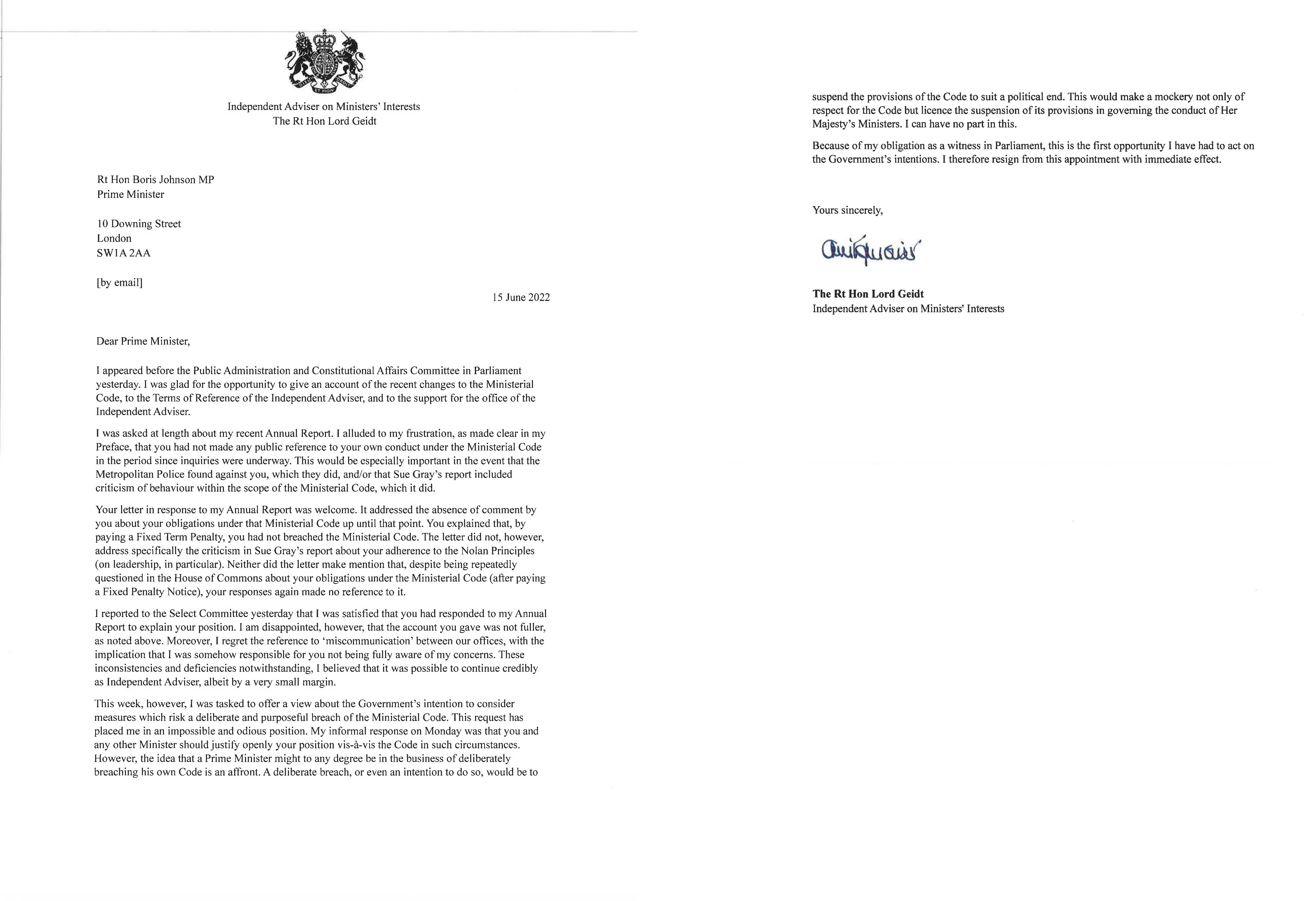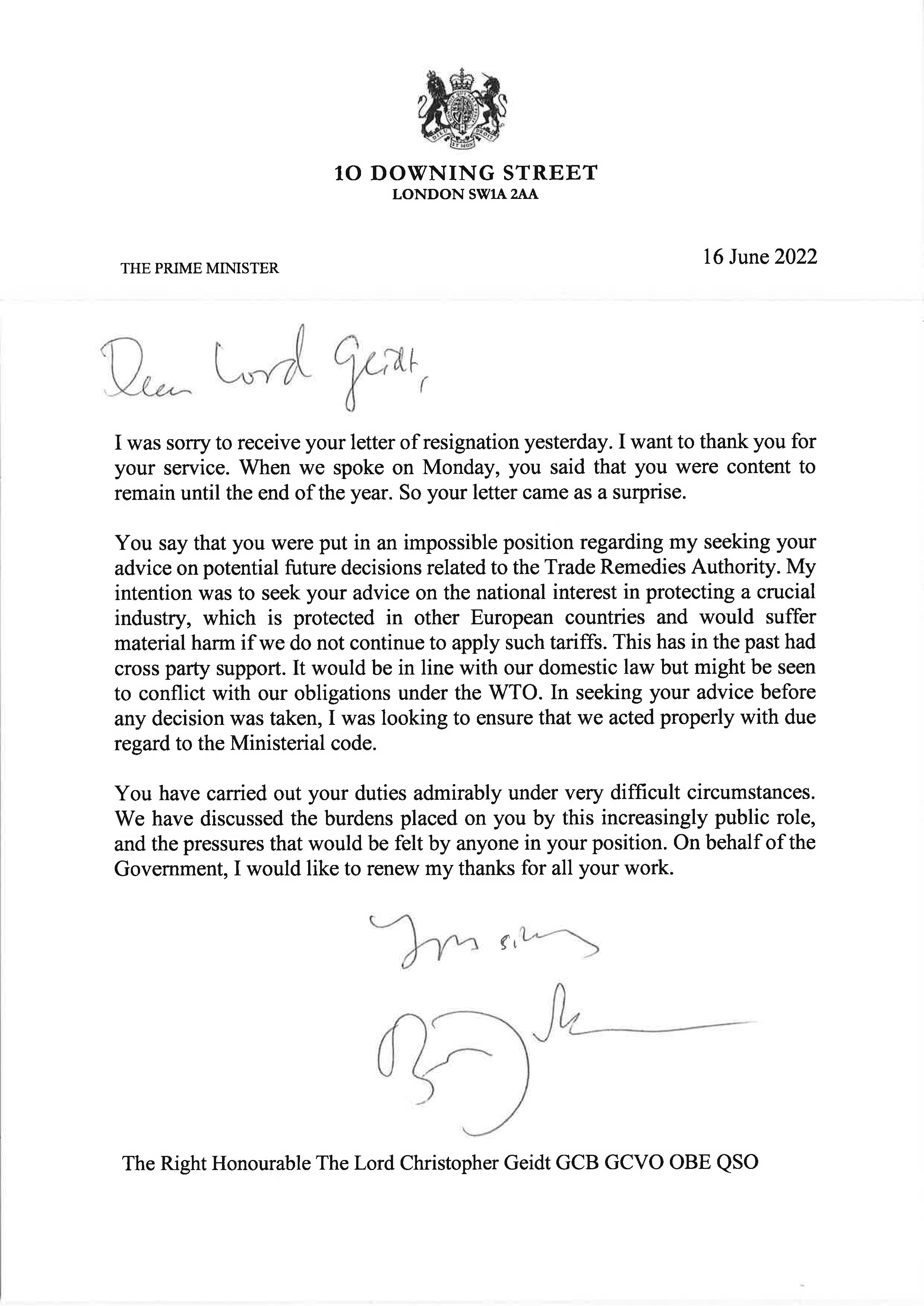
Boris Johnson’s ministerial interests adviser’s resignation over the Government’s willingness to breach the Ministerial Code over trade policy came as a “final straw” on top of partygate, according to the Prime Minister’s first ethics adviser to quit.
Lord Geidt said in his resignation letter that he had been only credibly clinging on to his role “by a very small margin” over lockdown-busting parties in Downing Street.
But the peer said he finally quit when the Prime Minister forced him into an “impossible and odious” position by considering action risking a “deliberate and purposeful” breach of the code, which has widely been taken to mean the question of extending tariffs on steel imports despite possibly breaking World Trade Organisation (WTO) commitments.
Downing Street declined to comment on whether it related to steel tariffs, and suggested Mr Johnson was considering not replacing Lord Geidt as the adviser who rules on whether ministers break the code.
Sir Alex Allan, who in 2020 was the first of Mr Johnson’s ethics advisers to resign, backed Lord Geidt for standing up for his principles.
He told BBC Newscast: “I think this was the final straw coming on top of, for example, his concerns about the fact the Prime Minister hadn’t said anything about the Ministerial Code in all of his explanations of the partygate saga”.
Sir Alex, who quit after Mr Johnson refused to accept his finding that Home Secretary Priti Patel had bullied civil servants, pointed to a “combination of issues around partygate and then this particular issue about ministers, potentially at any rate, deliberately breaching the code”.

In the letter published on Thursday, Lord Geidt wrote that the idea the Prime Minister “might to any degree be in the business of deliberately breaching his own code is an affront” that would suspend the code “to suit a political end”.
“This would make a mockery not only of respect for the code but licence the suspension of its provisions in governing the conduct of Her Majesty’s ministers,” Lord Geidt wrote.
“I can have no part in this.”
Lord Geidt’s resignation on Wednesday came after he told MPs it was “reasonable” to suggest Mr Johnson broke the code by being fined by police for breaching Covid laws.

Rishi Sunak insisted that neither he nor Mr Johnson had broken the code, as the Prime Minister decided earlier this month.
In an interview with ITV News, the Chancellor said: “The ultimate arbiter of the Ministerial Code is the Prime Minister.
“That’s how our system works and the Prime Minister has fully addressed that matter previously.”
Mr Johnson’s response to Lord Geidt’s shock resignation after a year of dealing with partygate and questions over the redecoration of the Prime Minister’s Downing Street flat indicated that it ultimately came over a matter relating to the Trade Remedies Authority (TRA) that had previously had cross-party support.
Mr Johnson said his intention was to seek Lord Geidt’s “advice on the national interest in protecting” an unspecified industry, which is “protected in other European countries and would suffer material harm if we do not continue to apply such tariffs”.

Mr Johnson said the request would be in line with domestic law “but might be seen to conflict” with the UK’s obligations under the WTO.
The Prime Minister’s official spokesman declined to say what critical national industry was at the centre of the issue, citing the “commercial sensitivity” of the outstanding matter.
He said the function of the ministerial interests adviser was “vitally important” but that Mr Johnson was reviewing whether to fill the vacant position.
Instead, the Prime Minister wanted to “carefully consider” issues raised by Lord Geidt “before taking a decision on how best to fulfil that commitment about ensuring rigorous oversight and scrutiny of ministerial interests”.
Labour demanded that Mr Johnson appoint a new watchdog, with deputy leader Angela Rayner saying “there are now no ethics left in this Downing Street regime”.







